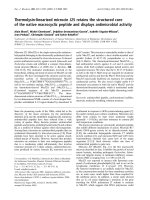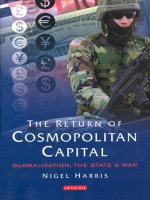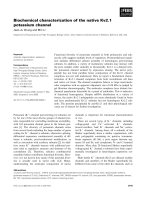The return of the native
Bạn đang xem bản rút gọn của tài liệu. Xem và tải ngay bản đầy đủ của tài liệu tại đây (1.52 MB, 425 trang )
TheProjectGutenbergeBook,TheReturnoftheNative,byThomasHardy
ThiseBookisfortheuseofanyoneanywhereatnocostandwith
almostnorestrictionswhatsoever.Youmaycopyit,giveitawayor
re-useitunderthetermsoftheProjectGutenbergLicenseincluded
withthiseBookoronlineatwww.gutenberg.org
Title:TheReturnoftheNative
Author:ThomasHardy
ReleaseDate:January12,2006[eBook#17500]
Mostrecentlyupdated:March13,2013
Language:English
Charactersetencoding:ISO-8859-1
***START OF THE PROJECT GUTENBERG EBOOK THE RETURN OF
THENATIVE***
E-textpreparedbyJosephE.Loewenstein,M.D.,andJohnHamm
THERETURNOFTHENATIVE
by
ThomasHardy
1912
CONTENTS
AUTHOR'SPREFACE
BOOKFIRST: THETHREEWOMEN
AFaceonWhichTimeMakesButLittle
I.
Impression
HumanityAppearsupontheScene,HandinHand
II.
withTrouble
III. TheCustomoftheCountry
IV. TheHaltontheTurnpikeRoad
V. PerplexityamongHonestPeople
VI. TheFigureagainsttheSky
VII. QueenofNight
ThoseWhoAreFoundWhereThereIsSaidtoBe
Nobody
IX. LoveLeadsaShrewdManintoStrategy
X. ADesperateAttemptatPersuasion
XI. TheDishonestyofanHonestWoman
BOOKSECOND: THEARRIVAL
I. TidingsoftheComer
II. ThePeopleatBlooms-EndMakeReady
III. HowaLittleSoundProducedaGreatDream
IV. EustaciaIsLedOntoanAdventure
V. ThroughtheMoonlight
VI. TheTwoStandFacetoFace
VII. ACoalitionbetweenBeautyandOddness
VIII. FirmnessIsDiscoveredinaGentleHeart
BOOKTHIRD: THEFASCINATION
I. "MyMindtoMeaKingdomIs"
II. TheNewCourseCausesDisappointment
III. TheFirstActinaTimewornDrama
IV. AnHourofBlissandManyHoursofSadness
V. SharpWordsAreSpoken,andaCrisisEnsues
VI. YeobrightGoes,andtheBreachIsComplete
VII. TheMorningandtheEveningofaDay
VIII. ANewForceDisturbstheCurrent
BOOKFOURTH: THECLOSEDDOOR
I. TheRencounterbythePool
HeIsSetUponbyAdversities;butHeSingsa
II.
Song
III. SheGoesOuttoBattleagainstDepression
IV. RoughCoercionIsEmployed
VIII.
V. TheJourneyacrosstheHeath
VI. AConjuncture,andItsResultuponthePedestrian
VII. TheTragicMeetingofTwoOldFriends
VIII. EustaciaHearsofGoodFortune,andBeholdsEvil
BOOKFIFTH: THEDISCOVERY
"WhereforeIsLightGiventoHimThatIsin
I.
Misery"
ALuridLightBreaksInuponaDarkened
II.
Understanding
III. EustaciaDressesHerselfonaBlackMorning
IV. TheMinistrationsofaHalf-ForgottenOne
V. AnOldMoveInadvertentlyRepeated
ThomasinArgueswithHerCousin,andHeWrites
VI.
aLetter
VII. TheNightoftheSixthofNovember
VIII. Rain,Darkness,andAnxiousWanderers
IX. SightsandSoundsDrawtheWanderersTogether
BOOKSIXTH: AFTERCOURSES
I. TheInevitableMovementOnward
ThomasinWalksinaGreenPlacebytheRoman
II.
Road
III. TheSeriousDiscourseofClymwithHisCousin
CheerfulnessAgainAssertsItselfatBlooms-End,
IV.
andClymFindsHisVocation
"Tosorrow
Ibadegoodmorrow,
Andthoughttoleaveherfarawaybehind;
Butcheerly,cheerly,
Shelovesmedearly;
Sheissoconstanttome,andsokind.
Iwoulddeceiveher,
Andsoleaveher,
Butah!sheissoconstantandsokind."
AUTHOR'SPREFACE
Thedateatwhichthefollowingeventsareassumedtohaveoccurredmaybe
setdownasbetween1840and1850,whentheoldwatering-placehereincalled
"Budmouth" still retained sufficient afterglow from its Georgian gaiety and
prestige to lend it an absorbing attractiveness to the romantic and imaginative
soulofalonelydwellerinland.
Under the general name of "Egdon Heath," which has been given to the
sombresceneofthestory,areunitedortypifiedheathsofvariousrealnames,to
thenumberofatleastadozen;thesebeingvirtuallyoneincharacterandaspect,
though their original unity, or partial unity, is now somewhat disguised by
intrusive strips and slices brought under the plough with varying degrees of
success,orplantedtowoodland.
It is pleasant to dream that some spot in the extensive tract whose southwesternquarterisheredescribed,maybetheheathofthattraditionaryKingof
Wessex—Lear.
July1895
POSTSCRIPT
To prevent disappointment to searchers for scenery it should be added that
thoughtheactionofthenarrativeissupposedtoproceedinthecentralandmost
secluded part of the heaths united into one whole, as above described, certain
topographicalfeaturesresemblingthosedelineatedreallylieonthemarginofthe
waste, severalmilestothewestwardofthecentre.Insomeotherrespects also
therehasbeenabringingtogetherofscatteredcharacteristics.
Thefirsteditionofthisnovelwaspublishedinthreevolumesin1878.
April1912
T.H.
BOOKFIRST
THETHREEWOMEN
I
AFaceonWhichTimeMakesButLittleImpression
ASaturdayafternooninNovemberwasapproachingthetimeoftwilight,and
the vast tract of unenclosed wild known as Egdon Heath embrowned itself
momentbymoment.Overheadthehollowstretchofwhitishcloudshuttingout
theskywasasatentwhichhadthewholeheathforitsfloor.
Theheavenbeingspreadwiththispallidscreenandtheearthwiththedarkest
vegetation,theirmeeting-lineatthehorizonwasclearlymarked.Insuchcontrast
theheathworetheappearanceofaninstalmentofnightwhichhadtakenupits
place before its astronomical hour was come: darkness had to a great extent
arrived hereon, while day stood distinct in the sky. Looking upwards, a furzecutterwouldhavebeeninclinedtocontinuework;lookingdown,hewouldhave
decidedtofinishhisfaggotandgohome.Thedistantrimsoftheworldandof
thefirmamentseemedtobeadivisionintimenolessthanadivisioninmatter.
Thefaceoftheheathbyitsmerecomplexionaddedhalfanhourtoevening;it
could in like manner retard the dawn, sadden noon, anticipate the frowning of
stormsscarcelygenerated,andintensifytheopacityofamoonlessmidnighttoa
causeofshakinganddread.
Infact,preciselyatthistransitionalpointofitsnightlyrollintodarknessthe
greatandparticulargloryoftheEgdonwastebegan,andnobodycouldbesaidto
understandtheheathwhohadnotbeenthereatsuchatime.Itcouldbestbefelt
when it could not clearly be seen, its complete effect and explanation lying in
thisandthesucceedinghoursbeforethenextdawn;then,andonlythen,didit
tellitstruetale.Thespotwas,indeed,anearrelationofnight,andwhennight
showeditselfanapparenttendencytogravitatetogethercouldbeperceivedinits
shadesandthescene.Thesombrestretchofroundsandhollowsseemedtorise
and meet the evening gloom in pure sympathy, the heath exhaling darkness as
rapidly as the heavens precipitated it. And so the obscurity in the air and the
obscurityinthelandclosedtogetherinablackfraternizationtowardswhicheach
advancedhalf-way.
The place became full of a watchful intentness now; for when other things
sank brooding to sleep the heath appeared slowly to awake and listen. Every
night its Titanic form seemed to await something; but it had waited thus,
unmoved,duringsomanycenturies,throughthecrisesofsomanythings,thatit
couldonlybeimaginedtoawaitonelastcrisis—thefinaloverthrow.
Itwasaspotwhichreturneduponthememoryofthosewholoveditwithan
aspectofpeculiarandkindlycongruity.Smilingchampaignsofflowersandfruit
hardly do this, for they are permanently harmonious only with an existence of
better reputation as to its issues than the present. Twilight combined with the
sceneryofEgdonHeathtoevolveathingmajesticwithoutseverity,impressive
without showiness, emphatic in its admonitions, grand in its simplicity. The
qualifications which frequently invest the façade of a prison with far more
dignitythanisfoundinthefaçadeofapalacedoubleitssizelenttothisheatha
sublimity in which spots renowned for beauty of the accepted kind are utterly
wanting.Fairprospectswedhappilywithfairtimes;butalas,iftimesbenotfair!
Men have oftener suffered from the mockery of a place too smiling for their
reason than from the oppression of surroundings oversadly tinged. Haggard
Egdon appealed to a subtler and scarcer instinct, to a more recently learnt
emotion,thanthatwhichrespondstothesortofbeautycalledcharmingandfair.
Indeed, it is a question if the exclusive reign of this orthodox beauty is not
approaching its last quarter. The new Vale of Tempe may be a gaunt waste in
Thule; human souls may find themselves in closer and closer harmony with
externalthingswearingasombrenessdistastefultoourracewhenitwasyoung.
Thetimeseemsnear,ifithasnotactuallyarrived,whenthechastenedsublimity
ofamoor,asea,oramountainwillbeallofnaturethatisabsolutelyinkeeping
with the moods of the more thinking among mankind. And ultimately, to the
commonest tourist, spots like Iceland may become what the vineyards and
myrtle-gardensofSouthEuropearetohimnow;andHeidelbergandBadenbe
passedunheededashehastensfromtheAlpstothesand-dunesofScheveningen.
The most thorough-going ascetic could feel that he had a natural right to
wanderonEgdon:hewaskeepingwithinthelineoflegitimateindulgencewhen
he laid himself open to influences such as these. Colours and beauties so far
subdued were, at least, the birthright of all. Only in summer days of highest
featherdiditsmoodtouchthelevelofgaiety.Intensitywasmoreusuallyreached
bywayofthesolemnthanbywayofthebrilliant,andsuchasortofintensity
was often arrived at during winter darkness, tempests, and mists. Then Egdon
wasarousedtoreciprocity;forthestormwasitslover,andthewinditsfriend.
Then it became the home of strange phantoms; and it was found to be the
hitherto unrecognized original of those wild regions of obscurity which are
vaguelyfelttobecompassingusaboutinmidnightdreamsofflightanddisaster,
andareneverthoughtofafterthedreamtillrevivedbysceneslikethis.
It was at present a place perfectly accordant with man's nature—neither
ghastly,hateful,norugly;neithercommonplace,unmeaning,nortame;but,like
man,slightedandenduring;andwithalsingularlycolossalandmysteriousinits
swarthy monotony. As with some persons who have long lived apart, solitude
seemedtolookoutofitscountenance.Ithadalonelyface,suggestingtragical
possibilities.
This obscure, obsolete, superseded country figures in Domesday. Its
condition is recorded therein as that of heathy, furzy, briary wilderness
—"Bruaria."Thenfollowsthelengthandbreadthinleagues;and,thoughsome
uncertaintyexistsastotheexactextentofthisancientlinealmeasure,itappears
from the figures that the area of Egdon down to the present day has but little
diminished. "Turbaria Bruaria"—the right of cutting heath-turf—occurs in
chartersrelatingtothedistrict."Overgrownwithhethandmosse,"saysLeland
ofthesamedarksweepofcountry.
Hereatleastwereintelligiblefactsregardinglandscape—far-reachingproofs
productive of genuine satisfaction. The untameable, Ishmaelitish thing that
Egdonnowwasitalwayshadbeen.Civilizationwasitsenemy;andeversince
thebeginningofvegetationitssoilhadwornthesameantiquebrowndress,the
naturalandinvariablegarmentoftheparticularformation.Initsvenerableone
coatlayacertainveinofsatireonhumanvanityinclothes.Apersononaheath
inraimentofmoderncutandcolourshasmoreorlessananomalouslook.We
seemtowanttheoldestandsimplesthumanclothingwheretheclothingofthe
earthissoprimitive.
To recline on a stump of thorn in the central valley of Egdon, between
afternoon and night, as now, where the eye could reach nothing of the world
outside the summits and shoulders of heathland which filled the whole
circumferenceofitsglance,andtoknowthateverythingaroundandunderneath
hadbeenfromprehistorictimesasunalteredasthestarsoverhead,gaveballast
tothemindadriftonchange,andharassedbytheirrepressibleNew.Thegreat
inviolateplacehadanancientpermanencewhichtheseacannotclaim.Whocan
sayofaparticularseathatitisold?Distilledbythesun,kneadedbythemoon,it
isrenewedinayear,inaday,orinanhour.Theseachanged,thefieldschanged,
the rivers, the villages, and the people changed, yet Egdon remained. Those
surfaceswereneithersosteepastobedestructiblebyweather,norsoflatasto
be the victims of floods and deposits. With the exception of an aged highway,
and a still more aged barrow presently to be referred to—themselves almost
crystallized to natural products by long continuance—even the trifling
irregularitieswerenotcausedbypickaxe,plough,orspade,butremainedasthe
veryfinger-touchesofthelastgeologicalchange.
Theabove-mentionedhighwaytraversedthelowerlevelsoftheheath,from
onehorizontoanother.Inmanyportionsofitscourseitoverlaidanoldvicinal
way, which branched from the great Western road of the Romans, the Via
Iceniana,orIkenildStreet,hardby.Ontheeveningunderconsiderationitwould
havebeennoticedthat,thoughthegloomhadincreasedsufficientlytoconfuse
theminorfeaturesoftheheath,thewhitesurfaceoftheroadremainedalmostas
clearasever.
II
HumanityAppearsupontheScene,
HandinHandwithTrouble
Along the road walked an old man. He was white-headed as a mountain,
bowed in the shoulders, and faded in general aspect. He wore a glazed hat, an
ancient boat-cloak, and shoes; his brass buttons bearing an anchor upon their
face.Inhishandwasasilver-headedwalking-stick,whichheusedasaveritable
third leg, perseveringly dotting the ground with its point at every few inches'
interval. One would have said that he had been, in his day, a naval officer of
somesortorother.
Beforehimstretchedthelong,laboriousroad,dry,empty,andwhite.Itwas
quiteopentotheheathoneachside,andbisectedthatvastdarksurfacelikethe
parting-line on a head of black hair, diminishing and bending away on the
furthesthorizon.
Theoldmanfrequentlystretchedhiseyesaheadtogazeoverthetractthathe
had yet to traverse. At length he discerned, a long distance in front of him, a
movingspot,whichappearedtobeavehicle,anditprovedtobegoingthesame
way asthatinwhichhehimselfwasjourneying.Itwasthesingleatomoflife
thatthescenecontained,anditonlyservedtorenderthegenerallonelinessmore
evident.Itsrateofadvancewasslow,andtheoldmangaineduponitsensibly.
When hedrew nearerhe perceived ittobeaspringvan,ordinaryinshape,
but singular in colour, this being a lurid red. The driver walked beside it; and,
likehisvan,hewascompletelyred.Onedyeofthattincturecoveredhisclothes,
thecapuponhishead,hisboots,hisface,andhishands.Hewasnottemporarily
overlaidwiththecolour;itpermeatedhim.
The old man knew the meaning of this. The traveller with the cart was a
reddleman—apersonwhosevocationitwastosupplyfarmerswithreddingfor
theirsheep.HewasoneofaclassrapidlybecomingextinctinWessex,fillingat
present in the rural world the place which, during the last century, the dodo
occupied in the world of animals. He is a curious, interesting, and nearly
perishedlinkbetweenobsoleteformsoflifeandthosewhichgenerallyprevail.
Thedecayedofficer,bydegrees,cameupalongsidehisfellow-wayfarer,and
wishedhimgoodevening.Thereddlemanturnedhishead,andrepliedinsadand
occupied tones. He was young, and his face, if not exactly handsome,
approached so near to handsome that nobody would have contradicted an
assertion that it really was so in its natural colour. His eye, which glared so
strangely through his stain, was in itself attractive—keen as that of a bird of
prey, and blue as autumn mist. He had neither whisker nor moustache, which
allowedthesoftcurvesofthelowerpartofhisfacetobeapparent.Hislipswere
thin, and though, as it seemed, compressed by thought, there was a pleasant
twitchattheircornersnowandthen.Hewasclothedthroughoutinatight-fitting
suit of corduroy, excellent in quality, not much worn, and well-chosen for its
purpose,butdeprivedofitsoriginalcolourbyhistrade.Itshowedtoadvantage
the good shape of his figure. A certain well-to-do air about the man suggested
thathewasnotpoorforhisdegree.Thenaturalqueryofanobserverwouldhave
been,Whyshouldsuchapromisingbeingasthishavehiddenhisprepossessing
exteriorbyadoptingthatsingularoccupation?
Afterreplyingtotheoldman'sgreetingheshowednoinclinationtocontinue
intalk,althoughtheystillwalkedsidebyside,fortheeldertravellerseemedto
desire company. There were no sounds but that of the booming wind upon the
stretch of tawny herbage around them, the crackling wheels, the tread of the
men,andthefootstepsofthetwoshaggyponieswhichdrewthevan.Theywere
small, hardy animals, of a breed between Galloway and Exmoor, and were
knownas"heath-croppers"here.
Now, as they thus pursued their way, the reddleman occasionally left his
companion'sside,and,steppingbehindthevan,lookedintoitsinteriorthrougha
small window. The look was always anxious. He would then return to the old
man, who made another remark about the state of the country and so on, to
whichthereddlemanagainabstractedlyreplied,andthenagaintheywouldlapse
intosilence.Thesilenceconveyedtoneitheranysenseofawkwardness;inthese
lonely places wayfarers, after a first greeting, frequently plod on for miles
withoutspeech;contiguityamountstoatacitconversationwhere,otherwisethan
in cities, such contiguity can be put an end to on the merest inclination, and
wherenottoputanendtoitisintercourseinitself.
Possiblythesetwomightnothavespokenagaintilltheirparting,haditnot
beenforthereddleman'svisitstohisvan.Whenhereturnedfromhisfifthtime
oflookingintheoldmansaid,"Youhavesomethinginsidetherebesidesyour
load?"
"Yes."
"Somebodywhowantslookingafter?"
"Yes."
Not long after this a faint cry sounded from the interior. The reddleman
hastenedtotheback,lookedin,andcameawayagain.
"Youhaveachildthere,myman?"
"No,sir,Ihaveawoman."
"Thedeuceyouhave!Whydidshecryout?"
"Oh,shehasfallenasleep,andnotbeingusedtotraveling,she'suneasy,and
keepsdreaming."
"Ayoungwoman?"
"Yes,ayoungwoman."
"Thatwouldhaveinterestedmefortyyearsago.Perhapsshe'syourwife?"
"My wife!" said the other bitterly. "She's above mating with such as I. But
there'snoreasonwhyIshouldtellyouaboutthat."
"That'strue.Andthere'snoreasonwhyyoushouldnot.WhatharmcanIdo
toyouortoher?"
The reddleman looked in the old man's face. "Well, sir," he said at last, "I
knewherbeforetoday,thoughperhapsitwouldhavebeenbetterifIhadnot.But
she'snothingtome,andIamnothingtoher;andshewouldn'thavebeeninmy
vanifanybettercarriagehadbeentheretotakeher."
"Where,mayIask?"
"AtAnglebury."
"Iknowthetownwell.Whatwasshedoingthere?"
"Oh,notmuch—togossipabout.However,she'stiredtodeathnow,andnot
at all well, and that's what makes her so restless. She dropped off into a nap
aboutanhourago,and'twilldohergood."
"Anice-lookinggirl,nodoubt?"
"Youwouldsayso."
Theothertravellerturnedhiseyeswithinteresttowardsthevanwindow,and,
withoutwithdrawingthem,said,"IpresumeImightlookinuponher?"
"No,"saidthereddlemanabruptly."Itisgettingtoodarkforyoutoseemuch
ofher;and,morethanthat,Ihavenorighttoallowyou.ThankGodshesleeps
sowell:Ihopeshewon'twaketillshe'shome."
"Whoisshe?Oneoftheneighbourhood?"
"'Tisnomatterwho,excuseme."
"It is not that girl of Blooms-End, who has been talked about more or less
lately?Ifso,Iknowher;andIcanguesswhathashappened."
"'Tisnomatter…Now,sir,Iamsorrytosaythatweshallsoonhavetopart
company.Myponiesaretired,andIhavefurthertogo,andIamgoingtorest
themunderthisbankforanhour."
The elder traveller nodded his head indifferently, and the reddleman turned
hishorsesandvaninupontheturf,saying,"Goodnight."Theoldmanreplied,
andproceededonhiswayasbefore.
Thereddlemanwatchedhisformasitdiminishedtoaspeckontheroadand
becameabsorbedinthethickeningfilmsofnight.Hethentooksomehayfroma
trusswhichwasslungupunderthevan,and,throwingaportionofitinfrontof
the horses, made a pad of the rest, which he laid on the ground beside his
vehicle. Upon this he sat down, leaning his back against the wheel. From the
interioralowsoftbreathingcametohisear.Itappearedtosatisfyhim,andhe
musinglysurveyedthescene,asifconsideringthenextstepthatheshouldtake.
Todothingsmusingly,andbysmalldegrees,seemed,indeed,tobeadutyin
theEgdonvalleysatthistransitionalhour,fortherewasthatintheconditionof
theheathitselfwhichresembledprotractedandhaltingdubiousness.Itwasthe
qualityofthereposeappertainingtothescene.Thiswasnotthereposeofactual
stagnation, but the apparent repose of incredible slowness. A condition of
healthylifesonearlyresemblingthetorporofdeathisanoticeablethingofits
sort;toexhibittheinertnessofthedesert,andatthesametimetobeexercising
powersakintothoseofthemeadow,andevenoftheforest,awakenedinthose
who thought of it the attentiveness usually engendered by understatement and
reserve.
Thescenebeforethereddleman'seyeswasagradualseriesofascentsfrom
theleveloftheroadbackwardintotheheartoftheheath.Itembracedhillocks,
pits,ridges,acclivities,onebehindtheother,tillallwasfinishedbyahighhill
cuttingagainstthestilllightsky.Thetraveller'seyehoveredaboutthesethings
for a time, and finally settled upon one noteworthy object up there. It was a
barrow. This bossy projection of earth above its natural level occupied the
loftiest ground of the loneliest height that the heath contained. Although from
thevaleitappearedbutasawartonanAtlanteanbrow,itsactualbulkwasgreat.
Itformedthepoleandaxisofthisheatheryworld.
As the resting man looked at the barrow he became aware that its summit,
hitherto the highest object in the whole prospect round, was surmounted by
something higher. It rose from the semi-globular mound like a spike from a
helmet.Thefirstinstinctofanimaginativestrangermighthavebeentosuppose
itthepersonofoneoftheCeltswhobuiltthebarrow,sofarhadallofmodern
datewithdrawnfromthescene.Itseemedasortoflastmanamongthem,musing
foramomentbeforedroppingintoeternalnightwiththerestofhisrace.
Theretheformstood,motionlessasthehillbeneath.Abovetheplainrosethe
hill,abovethehillrosethebarrow,andabovethebarrowrosethefigure.Above
thefigurewasnothingthatcouldbemappedelsewherethanonacelestialglobe.
Suchaperfect,delicate,andnecessaryfinishdidthefiguregivetothedark
pile of hills that it seemed to be the only obvious justification of their outline.
Without it, there was the dome without the lantern; with it the architectural
demandsofthemassweresatisfied.Thescenewasstrangelyhomogeneous,in
thatthevale,the upland,thebarrow,andthefigureaboveitamountedonlyto
unity.Lookingatthisorthatmemberofthegroupwasnotobservingacomplete
thing,butafractionofathing.
Theformwassomuchlikeanorganicpartoftheentiremotionlessstructure
that to see it move would have impressed the mind as a strange phenomenon.
Immobilitybeingthechiefcharacteristicofthatwholewhichthepersonformed
portionof,thediscontinuanceofimmobilityinanyquartersuggestedconfusion.
Yetthatiswhathappened.Thefigureperceptiblygaveupitsfixity,shifteda
steportwo,andturnedround.Asifalarmed,itdescendedontherightsideofthe
barrow, with the glide of a water-drop down a bud, and then vanished. The
movement had been sufficient to show more clearly the characteristics of the
figure,andthatitwasawoman's.
Thereasonofhersuddendisplacementnowappeared.Withherdroppingout
ofsightontherightside,anew-comer,bearingaburden,protrudedintothesky
on the left side, ascended the tumulus, and deposited the burden on the top. A
secondfollowed,thenathird,afourth,afifth,andultimatelythewholebarrow
waspeopledwithburdenedfigures.
The only intelligible meaning in this sky-backed pantomime of silhouettes
wasthatthewomanhadnorelationtotheformswhohadtakenherplace,was
sedulously avoiding these, and had come thither for another object than theirs.
The imagination of the observer clung by preference to that vanished, solitary
figure,astosomethingmoreinteresting,moreimportant,morelikelytohavea
historyworthknowingthanthesenew-comers,andunconsciouslyregardedthem
as intruders. But they remained, and established themselves; and the lonely
personwhohithertohadbeenqueenofthesolitudedidnotatpresentseemlikely
toreturn.
III
TheCustomoftheCountry
Had a looker-on been posted in the immediate vicinity of the barrow, he
wouldhavelearnedthatthesepersonswereboysandmenoftheneighbouring
hamlets. Each, as he ascended the barrow, had been heavily laden with furze-
faggots, carried upon the shoulder by means of a long stake sharpened at each
endforimpalingthemeasily—twoinfrontandtwobehind.Theycamefroma
partoftheheathaquarterofamiletotherear,wherefurzealmostexclusively
prevailedasaproduct.
Every individual was so involved in furze by his method of carrying the
faggotsthatheappearedlikeabushonlegstillhehadthrownthemdown.The
party had marched in trail, like a travelling flock of sheep; that is to say, the
strongestfirst,theweakandyoungbehind.
The loads were all laid together, and a pyramid of furze thirty feet in
circumference now occupied the crown of the tumulus, which was known as
Rainbarrow for many miles round. Some made themselves busy with matches,
andinselectingthedriesttuftsoffurze,othersinlooseningthebramblebonds
whichheldthefaggotstogether.Others,again,whilethiswasinprogress,lifted
theireyesandsweptthevastexpanseofcountrycommandedbytheirposition,
nowlyingnearlyobliteratedbyshade.Inthevalleysoftheheathnothingsaveits
ownwildfacewasvisibleatanytimeofday;butthisspotcommandedahorizon
enclosingatractoffarextent,andinmanycaseslyingbeyondtheheathcountry.
Noneofitsfeaturescouldbeseennow,butthewholemadeitselffeltasavague
stretchofremoteness.
While the men and lads were building the pile, a change took place in the
mass of shade which denoted the distant landscape. Red suns and tufts of fire
one by one began to arise, flecking the whole country round. They were the
bonfires of other parishes and hamlets that were engaged in the same sort of
commemoration. Some were distant, and stood in a dense atmosphere, so that
bundles of pale strawlike beams radiated around them in the shape of a fan.
Somewerelargeandnear,glowingscarlet-redfromtheshade,likewoundsina
black hide. Some were Maenades, with winy faces and blown hair. These
tincturedthesilentbosomofthecloudsabovethemandlituptheirephemeral
caves,whichseemedthenceforthtobecomescaldingcaldrons.Perhapsasmany
asthirtybonfirescouldbecountedwithinthewholeboundsofthedistrict;and
as the hour may be told on a clock-face when the figures themselves are
invisible, so did the men recognize the locality of each fire by its angle and
direction,thoughnothingofthescenerycouldbeviewed.
The first tall flame from Rainbarrow sprang into the sky, attracting all eyes
thathadbeenfixedonthedistantconflagrationsbacktotheirownattemptinthe
samekind.Thecheerfulblazestreakedtheinnersurfaceofthehumancircle—
now increased by other stragglers, male and female—with its own gold livery,
and even overlaid the dark turf around with a lively luminousness, which
softenedoffintoobscuritywherethebarrowroundeddownwardsoutofsight.It
showedthebarrowtobethesegmentofaglobe,asperfectasonthedaywhenit
was thrown up, even the little ditch remaining from which the earth was dug.
Not a plough had ever disturbed a grain of that stubborn soil. In the heath's
barrenness to the farmer lay its fertility to the historian. There had been no
obliteration,becausetherehadbeennotending.
Itseemedasifthebonfire-makerswerestandinginsomeradiantupperstory
of the world, detached from and independent of the dark stretches below. The
heath down there was now a vast abyss, and no longer a continuation of what
theystoodon;fortheireyes,adaptedtotheblaze,couldseenothingofthedeeps
beyond its influence. Occasionally, it is true, a more vigorous flare than usual
from their faggots sent darting lights like aides-de-camp down the inclines to
somedistantbush,pool,orpatchofwhitesand,kindlingthesetorepliesofthe
same colour, till all was lost in darkness again. Then the whole black
phenomenon beneath represented Limbo as viewed from the brink by the
sublimeFlorentineinhisvision,andthemutteredarticulationsofthewindinthe
hollows were as complaints and petitions from the "souls of mighty worth"
suspendedtherein.
It was as if these men and boys had suddenly dived into past ages, and
fetched therefrom an hour and deed which had before been familiar with this
spot.TheashesoftheoriginalBritishpyrewhichblazedfromthatsummitlay
freshandundisturbedinthebarrowbeneaththeirtread.Theflamesfromfuneral
piles long ago kindled there had shone down upon the lowlands as these were
shiningnow.FestivalfirestoThorandWodenhadfollowedonthesameground
anddulyhadtheirday.Indeed,itisprettywellknownthatsuchblazesasthisthe
heathmen were now enjoying are rather the lineal descendants from jumbled
DruidicalritesandSaxonceremoniesthantheinventionofpopularfeelingabout
GunpowderPlot.
Moreovertolightafireistheinstinctiveandresistantactofmanwhen,atthe
winter ingress, the curfew is sounded throughout Nature. It indicates a
spontaneous, Promethean rebelliousness against that fiat that this recurrent
season shall bring foul times, cold darkness, misery and death. Black chaos
comes,andthefetteredgodsoftheearthsay,Lettherebelight.
The brilliant lights and sooty shades which struggled upon the skin and
clothes of the persons standing round caused their lineaments and general
contourstobedrawnwithDureresquevigouranddash.Yetthepermanentmoral
expressionofeachfaceitwasimpossibletodiscover,forasthenimbleflames
towered, nodded, and swooped through the surrounding air, the blots of shade
and flakes of light upon the countenances of the group changed shape and
position endlessly. All was unstable; quivering as leaves, evanescent as
lightning.Shadowyeye-sockets,deepasthoseofadeath'shead,suddenlyturned
into pits of lustre: a lantern-jaw was cavernous, then it was shining; wrinkles
were emphasized to ravines, or obliterated entirely by a changed ray. Nostrils
were dark wells; sinews in old necks were gilt mouldings; things with no
particularpolishonthemwereglazed;brightobjects,suchasthetipofafurzehookoneofthemencarried,wereasglass;eyeballsglowedlikelittlelanterns.
Those whom Nature had depicted as merely quaint became grotesque, the
grotesquebecamepreternatural;forallwasinextremity.
Henceitmaybethatthefaceofanoldman,whohadlikeothersbeencalled
totheheightsbytherisingflames,wasnotreallythemerenoseandchinthatit
appeared to be, but an appreciable quantity of human countenance. He stood
complacentlysunninghimselfintheheat.Withaspeaker,orstake,hetossedthe
outlying scraps of fuel into the conflagration, looking at the midst of the pile,
occasionallyliftinghiseyestomeasuretheheightoftheflame,ortofollowthe
great sparks which rose with it and sailed away into darkness. The beaming
sight, and the penetrating warmth, seemed to breed in him a cumulative
cheerfulness, which soon amounted to delight. With his stick in his hand he
begantojigaprivateminuet,abunchofcoppersealsshiningandswinginglike
apendulumfromunderhiswaistcoat:healsobegantosing,inthevoiceofabee
upaflue—
"Theking´call'ddown´hisno-blesall´,
Byone´,bytwo´,bythree´;
EarlMar´-shal,I'll´goshrive´-thequeen´,
Andthou´shaltwend´withme´.
"Aboon´,aboon´,quothEarl´Mar-shal´,
Andfell´onhisbend´-dedknee´,
Thatwhat´-so-e'er´thequeen´shallsay´,
Noharm´there-of´maybe´."
Want of breath prevented a continuance of the song; and the breakdown
attracted the attention of a firm-standing man of middle age, who kept each
cornerofhiscrescent-shapedmouthrigorouslydrawnbackintohischeek,asif
to do away with any suspicion of mirthfulness which might erroneously have
attachedtohim.
"Afairstave,GrandferCantle;butIamafeard'tistoomuchforthemouldy
weasand of such a old man as you," he said to the wrinkled reveller. "Dostn't
wish th' wast three sixes again, Grandfer, as you was when you first learnt to
singit?"
"Hey?"saidGrandferCantle,stoppinginhisdance.
"Dostn't wish wast young again, I say? There's a hole in thy poor bellows
nowadaysseemingly."
"Butthere'sgoodartinme?IfIcouldn'tmakealittlewindgoalongwaysI
shouldseemnoyoungerthanthemostagedman,shouldI,Timothy?"
"Andhowaboutthenew-marriedfolksdownthereattheQuietWomanInn?"
the other inquired, pointing towards a dim light in the direction of the distant
highway,butconsiderablyapartfromwherethereddlemanwasatthatmoment
resting."What'stherightsofthematterabout'em?Yououghttoknow,beingan
understandingman."
"Butalittlerakish,hey?Iowntoit.MasterCantleisthat,orhe'snothing.Yet
'tisagayfault,neighbourFairway,thatagewillcure."
"Iheardthattheywerecominghometo-night.Bythistimetheymusthave
come.Whatbesides?"
"Thenextthingisforustogoandwish'emjoy,Isuppose?"
"Well,no."
"No?Now,Ithoughtwemust.Imust,or'twouldbeveryunlikeme—thefirst
ineveryspreethat'sgoing!
"Dothou´puton´afri´-ar'scoat´,
AndI'll´puton´a-no´-ther,
Andwe´willto´QueenEle´anorgo´,
LikeFri´arand´hisbro´ther.
"ImetMis'essYeobright,theyoungbride'saunt,lastnight,andshetoldme
thathersonClymwascominghomea'Christmas.Wonderfulclever,'abelieve—
ah,Ishouldliketohaveallthat'sunderthatyoungman'shair.Well,then,Ispoke
to her in my well-known merry way, and she said, 'O that what's shaped so
venerable should talk like a fool!'—that's what she said to me. I don't care for
her,bejownedifIdo,andsoItoldher.'BejownedifIcarefor'ee,'Isaid.Ihad
herthere—hey?"
"Iratherthinkshehadyou,"saidFairway.
"No,"saidGrandferCantle,hiscountenanceslightlyflagging."'Tisn'tsobad
asthatwithme?"
"Seemingly'tis;however,isitbecauseoftheweddingthatClymiscoming
homea'Christmas—tomakeanewarrangementbecausehismotherisnowleft
inthehousealone?"
"Yes, yes—that's it. But, Timothy, hearken to me," said the Grandfer
earnestly. "Though known as such a joker, I be an understanding man if you
catch me serious, and I am serious now. I can tell 'ee lots about the married
couple.Yes,thismorningatsixo'clocktheywentupthecountrytodothejob,
andneithervellnormarkhavebeenseenof'emsince,thoughIreckonthatthis
afternoon has brought 'em home again man and woman—wife, that is. Isn't it
spokelikeaman,Timothy,andwasn'tMis'essYeobrightwrongaboutme?"
"Yes, it will do. I didn't know the two had walked together since last fall,
when her aunt forbad the banns. How long has this new set-to been mangling
then?Doyouknow,Humphrey?"
"Yes, how long?" said Grandfer Cantle smartly, likewise turning to
Humphrey."Iaskthatquestion."
"Eversinceherauntalteredhermind,andsaidshemighthavethemanafter
all," replied Humphrey, without removing his eyes from the fire. He was a
somewhat solemn young fellow, and carried the hook and leather gloves of a
furze-cutter, his legs, by reason of that occupation, being sheathed in bulging
leggingsasstiffasthePhilistine'sgreavesofbrass."That'swhytheywentaway
to be married, I count. You see, after kicking up such a nunny-watch and
forbiddingthebanns'twouldhavemadeMis'essYeobrightseemfoolish-liketo
haveabangingweddinginthesameparishallasifshe'dnevergainsaidit."
"Exactly—seem foolish-like; and that's very bad for the poor things that be
so, though I only guess as much, to be sure," said Grandfer Cantle, still
strenuouslypreservingasensiblebearingandmien.
"Ah,well,Iwasatchurchthatday,"saidFairway,"whichwasaverycurious
thingtohappen."
"If'twasn'tmyname'sSimple,"saidtheGrandferemphatically."Iha'n'tbeen
thereto-year;andnowthewinterisa-comingonIwon'tsayIshall."
"Iha'n'tbeenthesethreeyears,"saidHumphrey;"forI'msodeadsleepyofa
Sunday;and'tissoterriblefartogetthere;andwhenyoudogetthere'tissucha
mortalpoorchancethatyou'llbechoseforupabove,whensomanybain't,thatI
bideathomeanddon'tgoatall."
"I not only happened to be there," said Fairway, with a fresh collection of
emphasis,"butIwassittinginthesamepewasMis'essYeobright.Andthough
youmaynotseeitassuch,itfairlymademybloodruncoldtohearher.Yes,itis
a curious thing; but it made my blood run cold, for I was close at her elbow."
Thespeakerlookedrounduponthebystanders,nowdrawingclosertohearhim,
with his lips gathered tighter than ever in the rigorousness of his descriptive
moderation.
"'Tisaseriousjobtohavethingshappento'eethere,"saidawomanbehind.
"'Yearetodeclareit,'wastheparson'swords,"Fairwaycontinued."Andthen
upstoodawomanatmyside—a-touchingofme.'Well,bedamnedifthereisn't
Mis'essYeobrighta-standingup,'Isaidtomyself.Yes,neighbours,thoughIwas
inthetempleofprayerthat'swhatIsaid.'Tisagainstmyconsciencetocurseand
swearincompany,andIhopeanywomanherewilloverlookit.StillwhatIdid
sayIdidsay,and'twouldbealieifIdidn'townit."
"So'twould,neighbourFairway."
"'Be damned if there isn't Mis'ess Yeobright a-standing up,' I said," the
narratorrepeated,givingoutthebadwordwiththesamepassionlessseverityof
faceasbefore,whichprovedhowentirelynecessityandnotgustohadtodowith
theiteration."AndthenextthingIheardwas,'Iforbidthebanns,'fromher.'I'll
speak to you after the service,' said the parson, in quite a homely way—yes,
turningallatonceintoacommonmannoholierthanyouorI.Ah,herfacewas
pale! Maybe you can call to mind that monument in Weatherbury church—the
cross-leggedsoldierthathavehadhisarmknockedawaybytheschool-children?
Well,hewouldabouthavematchedthatwoman'sface,whenshesaid,'Iforbid
thebanns.'"
The audience cleared their throats and tossed a few stalks into the fire, not
becausethesedeedswereurgent,buttogivethemselvestimetoweighthemoral
ofthestory.
"I'msurewhenIheardthey'dbeenforbidIfeltasgladasifanybodyhadgied
mesixpence,"saidanearnestvoice—thatofOllyDowden,awomanwholived
by making heath brooms, or besoms. Her nature was to be civil to enemies as
wellastofriends,andgratefultoalltheworldforlettingherremainalive.
"Andnowthemaidhavemarriedhimjustthesame,"saidHumphrey.
"AfterthatMis'essYeobrightcameroundandwasquiteagreeable,"Fairway
resumed, with an unheeding air, to show that his words were no appendage to
Humphrey's,buttheresultofindependentreflection.
"Supposingtheywereashamed,Idon'tseewhytheyshouldn'thavedoneit









